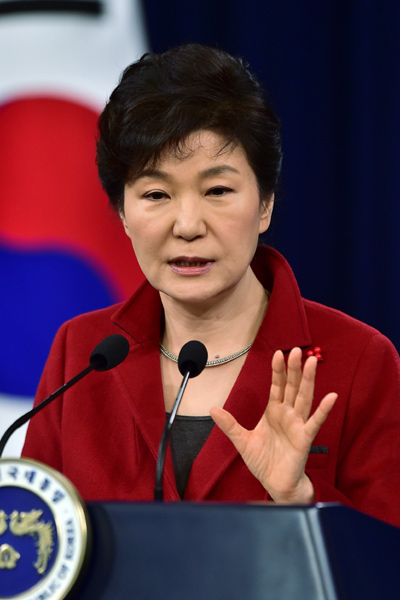 |
|
South Korean President Park Geun-Hye speaks during her New Year news conference at the presidential Blue House in Seoul, Jan 12, 2015. [Photo/Agencies] |
SEOUL - South Korean President Park Geun-hye's approval rating has declined to the lowest since her inauguration, as the revised tax code provoked a public anger over the Park administration after a hike in tobacco prices.
Park's approval rating fell 3.8 percentage points from a week earlier to 39.4 percent in the second week of January, marking the lowest since she took office in February 2013, according to a pollster Realmeter.
Finance Minister Choi Kyung-hwan held an unscheduled press conference Tuesday to explain the revised tax code, claiming that it will reduce tax burden for low-income bracket while increasing those for high-salary class.
Despite his explanation, public fury remained as the year-end tax adjustment drove many middle-income earners to pay additional taxes.
The finance ministry changed the way of the year-end tax adjustment, called a year-end bonus before, last year in its regular tax code revision, from income deduction to tax deduction. It actually increased tax burden for people, especially middle- income earners.
Choi told reporters that he will consider complementing the tax code later this year after ending the year-end tax adjustment in March.
The tax adjustment has been called a "year-end bonus" as wage earners get tax return early in the next year after paying more tax a year earlier without income or tax deductions considered.
Many of local media and opposition lawmakers criticized the government for raising tax burden, calling it a "year-end tax bomb. "
Public anger escalated further on reduced burden for corporate tax, the rate of which was lowered under the Lee Myung-bak administration.
According to the parliamentary budget office, the government's tax revenue from companies reduced 37.2 trillion won (34.2 billion U.S. dollars) for five years from 2009 when the lower corporate tax came into force.
Among the total, the 27.8 trillion won tax reduction belonged to big corporations, with the remaining 9.4 trillion won benefiting small companies.
 China's big train makers reunite in quest for overseas business
China's big train makers reunite in quest for overseas business
China's big train makers reunite in quest for overseas business
